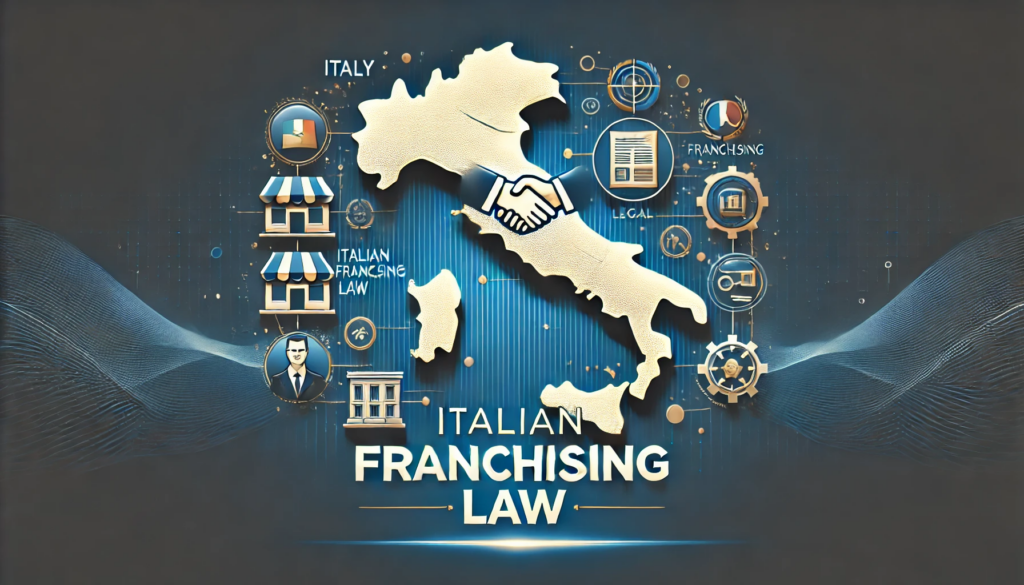Italian Franchising Law: A Detailed Guide for International Clients
Italian Franchising Law: A Detailed Guide for International Clients
Franchising has become a highly popular business model in Italy, offering unique opportunities for international companies to expand into one of Europe’s most dynamic markets. To successfully navigate the Italian legal framework, it’s crucial to understand the specific laws, requirements, and practices governing franchising agreements. This comprehensive guide will walk you through the key aspects of Italian franchising law, ensuring you’re well-prepared for your venture.
What is a Franchising Agreement?
Franchising, also known as commercial affiliation, is a legal contract where a franchisor grants a franchisee the right to operate under its business model. This includes access to intellectual property, such as trademarks and know-how, and integration into a distribution network. In return, the franchisee pays entry fees and royalties.
Legal Basis in Italy
In Italy, franchising is regulated by Law 6 May 2004, No. 129, a specific legal framework designed to ensure transparency and balance between the parties. This law defines franchising as:
A contractual relationship where one party provides a tested business formula, granting the other party the right to use it for commercial purposes.
Key Features of Italian Franchising Agreements
Italian law mandates that all franchising agreements must be formalized in writing, as oral agreements are not legally binding. This requirement ensures that both parties clearly understand their roles and obligations. The agreement must detail essential elements such as the initial investments, royalty calculation, territorial exclusivity, and a description of the know-how provided by the franchisor. By setting these standards, the law minimizes potential disputes and establishes a solid foundation for the business relationship. and establishes a solid foundation for the business relationship.
Transparency in the Pre-Contractual Phase
Transparency is a cornerstone of Italian franchising law. Before entering into an agreement, franchisors must provide prospective franchisees with a comprehensive disclosure package. This includes detailed information about the franchisor’s financial records, trademarks, franchise network, and any legal disputes. Failure to comply can result in annulment of the contract or legal claims for damages. with these obligations can result in the annulment of the contract or legal claims for damages.
The Importance of Know-How
Know-how is a critical element in franchising agreements, representing the franchisor’s proprietary knowledge and expertise. This may include business manuals, marketing strategies, or proprietary processes that enable the franchisee to replicate the franchisor’s success. Its inclusion significantly enhances the value of the contract, ensuring clarity and mutual understanding. and mutual understanding.
Tax Considerations for Franchising
Tax implications play a significant role in franchising agreements. For franchisors, entry fees and royalties are treated as taxable income, while for franchisees, these payments are considered deductible costs. VAT regulations apply, offering potential financial benefits. Understanding these aspects is crucial for proper budgeting and compliance..
Duration and Termination of Agreements
Italian franchising agreements must have a minimum duration of three years, allowing franchisees to amortize their investments. Clear provisions for renewal and termination create a stable and predictable framework, fostering trust and cooperation..
Why Choose Italy for Franchising?
Italy’s robust legal framework makes it an attractive destination for international franchisors. Its emphasis on transparency, pre-contractual disclosures, and clear contractual obligations creates a reliable business environment. The diverse regional markets also offer opportunities across various sectors, such as fashion, food, and technology., from fashion and food to technology and services.
Conclusion: Unlocking the Potential of Italian Franchising
Franchising offers a proven path for international businesses to establish a foothold in Italy. Success depends on understanding the country’s legal requirements and business practices. By embracing transparency, mutual respect, and compliance, franchisors and franchisees can achieve remarkable growth..
Our team at OS Law specializes in assisting international clients with franchising agreements in Italy. From drafting contracts to ensuring compliance with Italian law, we provide end-to-end support tailored to your needs. Contact us today to learn how we can help you unlock the potential of the Italian market.
Contact us to learn how we can support your expansion into Italy’s dynamic market!






